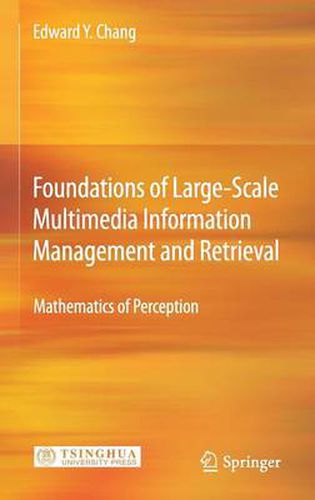Readings Newsletter
Become a Readings Member to make your shopping experience even easier.
Sign in or sign up for free!
You’re not far away from qualifying for FREE standard shipping within Australia
You’ve qualified for FREE standard shipping within Australia
The cart is loading…






This title is printed to order. This book may have been self-published. If so, we cannot guarantee the quality of the content. In the main most books will have gone through the editing process however some may not. We therefore suggest that you be aware of this before ordering this book. If in doubt check either the author or publisher’s details as we are unable to accept any returns unless they are faulty. Please contact us if you have any questions.
Foundations of Large-Scale Multimedia Information Management and Retrieval: Mathematics of Perception covers knowledge representation and semantic analysis of multimedia data and scalability in signal extraction, data mining, and indexing. The book is divided into two parts: Part I - Knowledge Representation and Semantic Analysis focuses on the key components of mathematics of perception as it applies to data management and retrieval. These include feature selection/reduction, knowledge representation, semantic analysis, distance function formulation for measuring similarity, and multimodal fusion. Part II - Scalability Issues presents indexing and distributed methods for scaling up these components for high-dimensional data and Web-scale datasets. The book presents some real-world applications and remarks on future research and development directions.
The book is designed for researchers, graduate students, and practitioners in the fields of Computer Vision, Machine Learning, Large-scale Data Mining, Database, and Multimedia Information Retrieval.
Dr. Edward Y. Chang was a professor at the Department of Electrical & Computer Engineering, University of California at Santa Barbara, before he joined Google as a research director in 2006. Dr. Chang received his M.S. degree in Computer Science and Ph.D degree in Electrical Engineering, both from Stanford University.
$9.00 standard shipping within Australia
FREE standard shipping within Australia for orders over $100.00
Express & International shipping calculated at checkout
This title is printed to order. This book may have been self-published. If so, we cannot guarantee the quality of the content. In the main most books will have gone through the editing process however some may not. We therefore suggest that you be aware of this before ordering this book. If in doubt check either the author or publisher’s details as we are unable to accept any returns unless they are faulty. Please contact us if you have any questions.
Foundations of Large-Scale Multimedia Information Management and Retrieval: Mathematics of Perception covers knowledge representation and semantic analysis of multimedia data and scalability in signal extraction, data mining, and indexing. The book is divided into two parts: Part I - Knowledge Representation and Semantic Analysis focuses on the key components of mathematics of perception as it applies to data management and retrieval. These include feature selection/reduction, knowledge representation, semantic analysis, distance function formulation for measuring similarity, and multimodal fusion. Part II - Scalability Issues presents indexing and distributed methods for scaling up these components for high-dimensional data and Web-scale datasets. The book presents some real-world applications and remarks on future research and development directions.
The book is designed for researchers, graduate students, and practitioners in the fields of Computer Vision, Machine Learning, Large-scale Data Mining, Database, and Multimedia Information Retrieval.
Dr. Edward Y. Chang was a professor at the Department of Electrical & Computer Engineering, University of California at Santa Barbara, before he joined Google as a research director in 2006. Dr. Chang received his M.S. degree in Computer Science and Ph.D degree in Electrical Engineering, both from Stanford University.